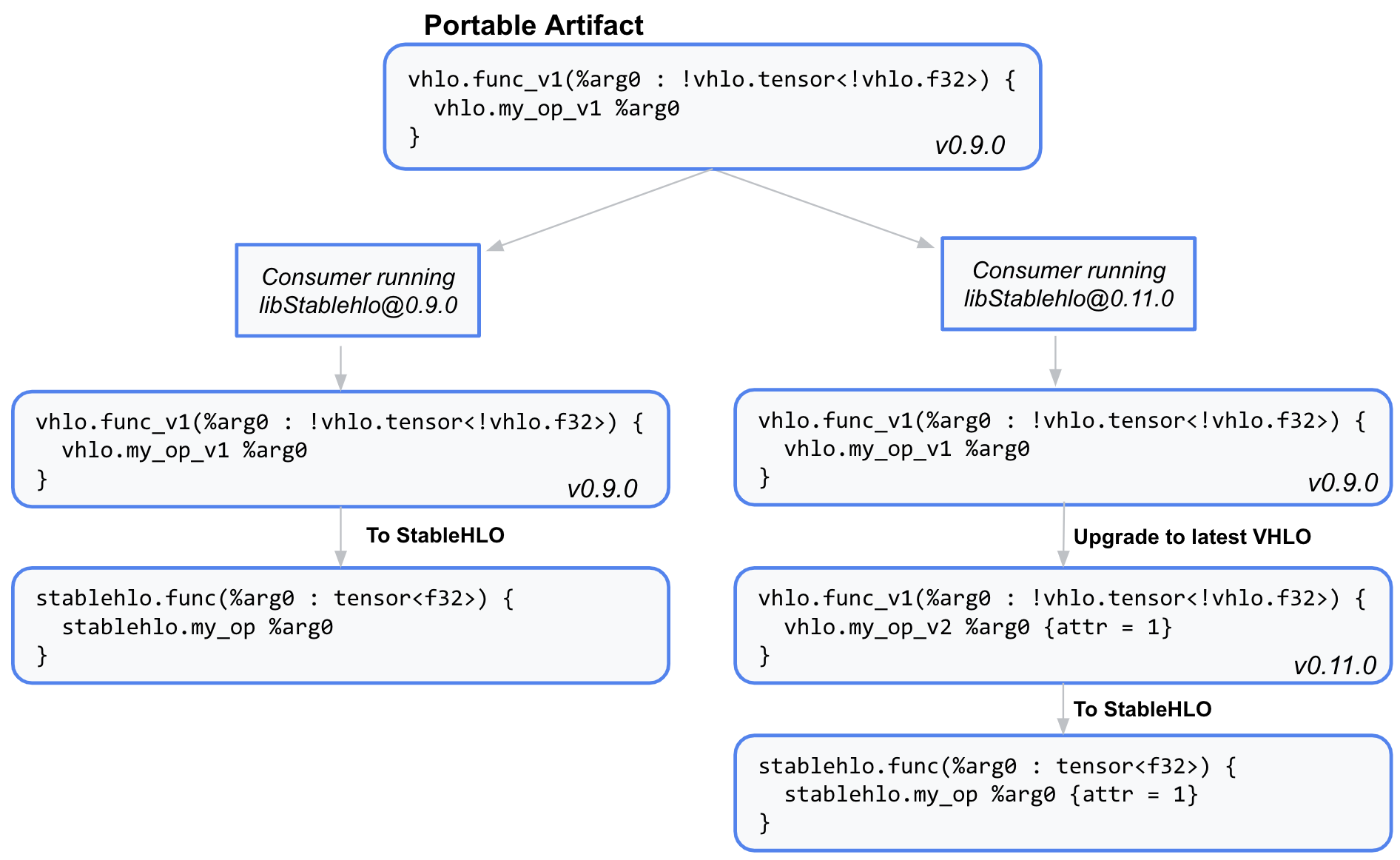See vhlo_checklist.md for steps to follow when making
changes to VHLO.
What is the VHLO Dialect?
The VHLO (Versioned StableHLO) Dialect is used for serialization and stability. It provides a snapshot of the StableHLO dialect at a given point in time by versioning individual program elements.
VHLO is an add-only dialect with versioned ops, types, and attributes, which means that once a feature is added to the dialect, it cannot be modified in any way that impact the semantics.
Any changes to an op, type, or attribute require a new version to be added to
the dialect. For example, if a hypothetical my_op was added to StableHLO in
0.9.0, but was changed in 0.11.0, we would have the following in VHLO:
// This represents the StableHLO version of the op from 0.9.0 -> 0.10.0
// Both the lower and the upper bound of versions are inclusive
def VHLO_MyOpV1 : VHLO_Op<"my_op_v1", "0.9.0", "0.10.0"> {
let arguments = (ins
VHLO_AnyType:$operand
);
let results = (outs VHLO_AnyType:$result);
}
// This represents the StableHLO version of the op from 0.11.0 -> current
def VHLO_MyOpV2 : VHLO_Op<"my_op_v2", "0.11.0", "current"> {
let arguments = (ins
VHLO_AnyType:$operand,
VHLO_AnyAttr:$attr // New attribute added to StableHLO in 0.11.0
);
let results = (outs VHLO_AnyType:$result);
}
The StableHLO dialect only has the latest version of the ops. In the running
example, the StableHLO dialect at v0.11.0 would only have the StableHLO_MyOp
that has operand and attr, while VHLO captures each phase of the op's
evolution.
Why is VHLO useful?
Having a versioned dialect allows us to target previous versions of the StableHLO opset. This encapsulates forward and backward compatibility in conversions between ops in the VHLO dialect.
Forward compatibility: Forward compatibility is provided by converting to VHLO and downgrading ops to a target version. If every op/type/attr in a VHLO program can be downgraded to the target version, it is guaranteed to be deserializable and convertable to StableHLO on a consumer running a version greater than or equal to the target version, since VHLO has a snapshot of the opset at that time.

This downgrade conversion will fail if ops or features that do not exist in the previous version of the opset are used. This means that forward compatibility is discovered on the producer, rather than at runtime.
Backward compatibility: Backward compatibility is provided by upgrading VHLO ops to their latest version (if needed), then converting an op back to StableHLO. All VHLO programs within the compatibility window are upgradable to StableHLO, meaning different versions of consumers can deserialize the same VHLO payload from a previous version.

More importantly, VHLO is abstracted behind serialization. This means that ML frameworks (producers) only need to target StableHLO ops, and compiler backends (consumers) only need to support the latest version, which is the StableHLO op set. Conversions to and from VHLO are taken care of with machinery maintained in the StableHLO repo.
MLIR Bytecode Format Versions
In order to maintain forward compatibility, StableHLO versions have an associated MLIR Bytecode Format version. Additionally, the latest version of StableHLO will use the latest version of the MLIR Bytecode Format. When the MLIR Bytecode Format version is incremented, the next release of StableHLO will increment the minor version and update Version.cpp to use the latest MLIR Bytecode Format version.
For details on MLIR Bytecode Format and the rationale for using it in StableHLO, see bytecode.md.
